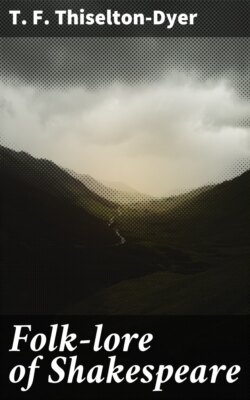Читать книгу Folk-lore of Shakespeare - T. F. Thiselton-Dyer - Страница 20
На сайте Литреса книга снята с продажи.
Оглавление“Under the lordly monarch of the north.”
Barbason. This demon would seem to be the same as “Marbas, alias Barbas,” who, as Scot[88] informs us, “is a great president, and appeareth in the forme of a mightie lion; but at the commandment of a conjurer cometh up in the likeness of man, and answereth fullie as touching anything which is hidden or secret.” In the “Merry Wives of Windsor” (ii. 2) it is mentioned by Ford in connection with Lucifer, and again in “Henry V.” (ii. 1) Nym tells Pistol: “I am not Barbason; you cannot conjure me.”
The names of the several fiends in “King Lear,” Shakespeare is supposed to have derived from Harsnet’s “Declaration of Egregious Popish Impostures” (1603).
Flibbertigibbet, one of the fiends that possessed poor Tom, is, we are told (iv. 1), the fiend “of mopping and mowing, who since possesses chambermaids and waiting-women.” And again (iii. 4), “he begins at curfew, and walks till the first cock; he gives the web and the pin.”
Frateretto is referred to by Edgar (iii. 6): “Frateretto calls me; and tells me, Nero is an angler in the lake of darkness. Pray, innocent, and beware the foul fiend.”
Hobbididance is noticed as “prince of dumbness” (iv. 1), and perhaps is the same as Hopdance (iii. 6), “who cries,” says Edgar, “in Tom’s belly for two white herring.”
Mahu, like Modo, would seem to be another name for “the prince of darkness” (iii. 4), and further on (iv. 1) he is spoken of as the fiend “of stealing;” whereas the latter is described as the fiend “of murder.” Harsnet thus speaks of them: “Maho was general dictator of hell; and yet, for good manners’ sake, he was contented of his good nature to make show, that himself was under the check of Modu, the graund devil in Ma(ister) Maynie.”
Obidicut, another name of the fiend known as Haberdicut (iv. 1).
Smulkin (iii. 4). This is spelled Smolkin by Harsnet.
Thus, in a masterly manner, Shakespeare has illustrated and embellished his plays with references to the demonology of the period; having been careful in every case—while enlivening his audience—to convince them of the utter absurdity of this degraded form of superstition.
